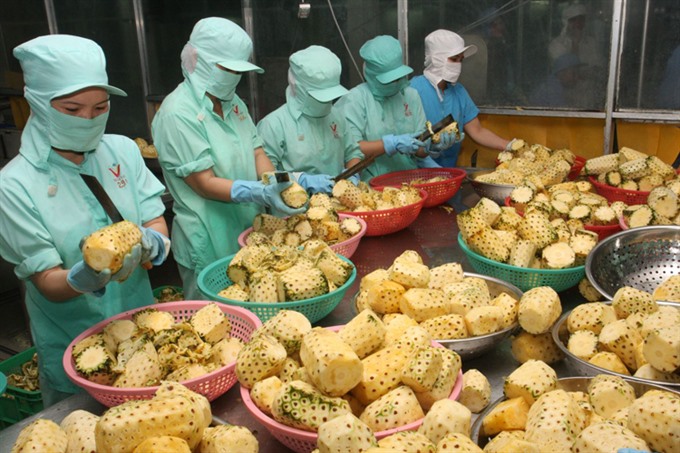 Economy
Economy

At a conference to review the industry and trade sector in 2017, Prime Minister Nguyễn Xuân Phúc lauded the sector’s accomplishment of reaching US$200 billion export turnover for the first time, the abolishment of 675 business and investment conditions (about half the previous total 1,216 regulations) and the settlement of 12 loss-making projects.
 |
| A pineapple processing line for exports. The country earned US$200 billion export turnover for the first time in 2017. — Photo baocongthuong.com.vn |
HÀ NỘI — At a conference to review the industry and trade sector in 2017, Prime Minister Nguyễn Xuân Phúc lauded the sector’s accomplishment of reaching US$200 billion export turnover for the first time, the abolishment of 675 business and investment conditions (about half the previous total 1,216 regulations) and the settlement of 12 loss-making projects.
“The Ministry of Industry and Trade became the pioneer among the country’s ministries to cut administrative procedures, thus improving national competitiveness,” he said at the conference in Hà Nội on Monday.
MoIT’s groups and corporations were also praised for their success in privatisation efforts. Of these, the listing of Saigon Beer, Alcohol and Beverage Corporation (Sabeco) on the stock market has become the largest IPO in the country so far, receiving an estimated VNĐ110 trillion ($4.89 billion).
“This is a very profound lesson in the privatisation of State-owned enterprises as a measure against corruption and bureaucracy, bringing the Government nearly $5 billion,” the PM said.
He highlighted the importance of shifting attitudes and defining long-term visions. Officials from the ministry were asked to overcome outdated thinking to grasp opportunities and work with other sectors.
Phúc also pointed out weaknesses within the ministry, including the slow introduction of strategies and plans; limited implementation and research in industrial development in line with the fourth industrial revolution; weak market forecasts; low competitiveness and heavy reliance on the FDI sector.
He urged the ministry to be swift in restructuring SOEs, especially groups and corporations in key economic sectors. This would be save management costs and improve effectiveness in the short-term and accelerate restructuring, thus ensuring sustainable growth of the economy in the long-term.
PM Phúc stressed that in 2018 and the next couple of years, industrial production, exports and domestic trade must develop in favour of hi-tech, competitive and environmentally friendly products. The sector was asked to develop exports and maintain domestic markets.
The MoIT was asked to combat illegal trading and trade fraud and to protect domestic production.
Industrial production motive for industrial growth: minister
Minister of Industry and Trade Trần Tuấn Anh noted that the index of industrial production grew 9.4 per cent in 2017, well above the growth of 7.4 per cent in the previous year, driven by steady expansion in manufacturing-processing (14.5 per cent), he noted.
Consumption of the manufacturing-processing sector continued to enjoy an upward trend with an increase of 13.6 per cent as of November 2017, higher than the 8.5-per cent rise in 2016, the minister highlighted. He said that the two-digit growth was seen in the consumption of beverages and garments and textiles and the production of leather, leather products, medicine and pharmaceuticals, which boosted domestic production.
He noticed that the inventory index witnessed a year-on-year surge of 8 per cent, lower than the 8.3 per cent year-on-year increase in 2016.
Production of the manufacturing-processing sector is forecast to continue to be on track in 2018 thanks to numerous operational investment projects. The ministry is working on the restructuring of state-owned enterprises to improve business efficiency in key industrial segments of the country to realise the sector’s goal of 9 per cent growth in 2018.
The move aims to slash management costs, improve business operations and ensure sustainable economic growth in the coming years, Anh said.
The ministry will prioritise networking events to connect and support local firms so that they can participate in the global supply chain while focusing on foreign-invested projects to take advantage of economic integration.
Under the support industry development programme, the ministry has carried out an array of projects to back the automobile industry, electronics industry, garment and textiles and leather shoes. — VNS




